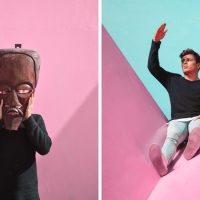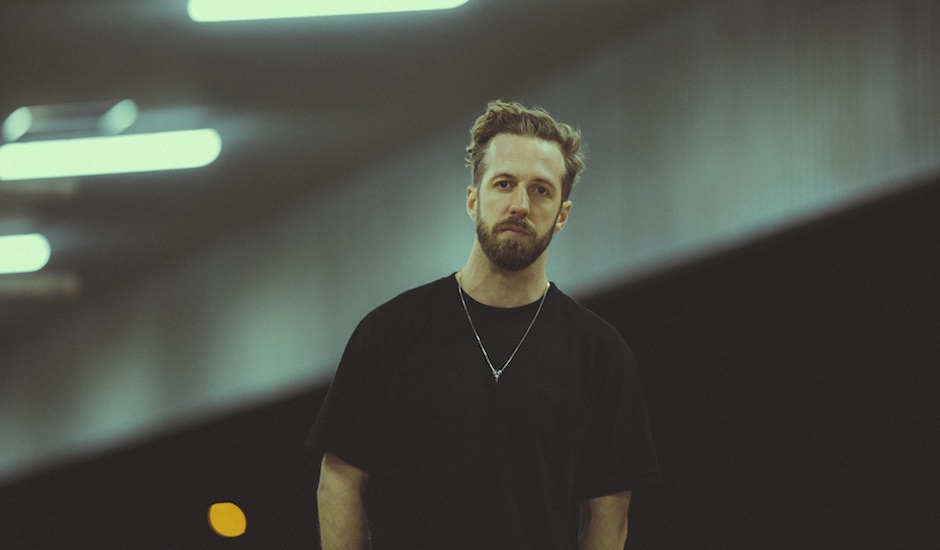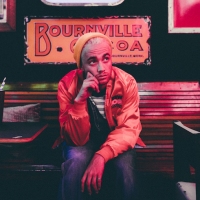 Exclusive: Stream Flamingo Jones' new EP, his "personal invitation to a tropical island rave."Entitled Lazers In The Jungle, it's the new soundtrack to your summer.
Exclusive: Stream Flamingo Jones' new EP, his "personal invitation to a tropical island rave."Entitled Lazers In The Jungle, it's the new soundtrack to your summer.

SHOCKONE Interview: "I sometimes feel like an outsider in the Oz musical landscape."
Check out his new Matsu-directed video as the Dark Machine Tour nears kick-off.
SHOCKONE made a triumphant return to the Australian electronic music world a couple of weeks back with a mean new single in A Dark Machine, featuring the vocals of regular collaborator and his sister, Reija Lee. It's the first new music from the globally-adored producer since last year's In This Light EP, and it finds SHOCKONE in fine form, ready to grace some big stages and go out of 2017 with a bang. Today saw the release of the single's accompanying video clip, an appropriately dark and futuristic visual directed by WA-based auteur Matsu. With the A Dark Machine Tour kicking off in Canberra next week, we got some time with the man whose friends know as Karl Thomas, and he was as wonderfully honest and forthcoming as ever. Check it all out below, along with that full run of dates down the bottom.
Hey mate! First off, I think a very belated congratulations is in order for the release of A Dark Machine. It’s only been out for two weeks, but are you happy with how it has been received so far?
Hi, and firstly thank you. Yeah I am really happy with the reception of the single. I don't really read things like YouTube or Soundcloud comments, but I have had a lot of messages from people letting me know how much they're enjoying the track, which I really appreciate. To this day I am still humbled by the support and response I get from people listening to my music. I feel really lucky that people have followed me through all the musical twist and turns that I've thrown out there over the years, and that they've been open minded enough to accept that an artist needs to grow and evolved through a career.
The track features Reija Lee, what’s the dynamic like working with Reija?
Well she is my sister, so it comes pretty naturally for us. I think because we are siblings it makes the writing process very open, and very honest. We can be brutal with each other without the fear of someone getting offended which I think results in a better outcome. If I think about it, I am probably a little too honest/brutal sometimes with Reija and I often demand a lot from her when we're writing, probably more than if it were someone else I was writing with... However I am lucky Reija has a super strong work ethic and is always willing to keep pushing on with a song until we both agree that it's working. The writing and recording of A Dark Machine is a great example actually. Reija broke her arm quite severely the day before we were due to work on it in the studio and start recording demo vocals, but even then she showed up, arm in a sling, and on some seriously strong painkillers to get to work. With every breath she took she was in pretty bad pain, but she got it done. In the end the vocals we recorded that day, which were just supposed to be working demo takes, ended up being the final takes you hear on the song, which I find quite amazing. She totally nailed that performance and so much of the emotional power of the song comes from her vocals.
It follows on from collaborations with Savoi and The Ragga Twins. I feel like vocal features on drum'n'bass records are quite rare, so I’m interested into why you’ve decided to work with so many vocalists recently. Is it to make your singles more approachable for those that dislike the heaviness of D'n'B?
When I'm writing I try not think in terms of genre, nor am I thinking about whether people will like it, or if it's going to be accessible or radio friendly or whatever, all I'm concerned with is trying to write the best song possible, if that means having a vocal on the song then that's what happens. The human voice is such a powerful musical tool that I often feel like I'm am selling myself short if I don't at least see what can happen with a vocal on a song, if there's no vibe when we try with vox then it's no loss, but more often than not, once I find/write a good vocal part for a song it elevates it to a whole new level.
I'm not concerned with other people’s musical tastes, that’s out of my control. All I can do is try and write music I vibe on and throw it out into the universe, the rest isn't any of my business.
You split your time between the UK and Perth, correct? Were there any immediately noticeable differences between the two scenes when you moved over to the UK?
The most obvious is just population, there just way more people in UK/Europe, which means more people to play to week in week out. I don't think Europe is as culturally and musically monopolised as Australia, but that's to be expected when you have 50 countries with 740 million people in less space than our one country! So with that being said I think it’s easier to find an audience for niche music over there. Culturally speaking there is more opportunity for genuine underground scenes to live and flourish over there. As an artist of an essentially niche/underground style of music, it's nice to feel connected something, and to be surrounded by peers working within that same realm. That’s the biggest difference for me between Australia and London.
In Australia I often feel like a bit of an outsider in the musical landscape, which can be tough if I'm honest, but on the flipside of that, I feel immensely lucky that I've been able to forge a successful career in Australia making music that is still quite niche here.
Did you feel like this move was a necessary one to further your career?
Yes, I do feel it was a necessary move, both personally and professionally. I needed to go and live amongst the scene and the people involved with the music that I make. I also think everyone should live in a country other than their birthplace at least once during their life. It opened my eyes to a lot, and helped me raise my own personal bench marks. Living in London is hard, which is a great thing. It's the kind of city that when you wake up you think, 'If I don't get up and work my arse off and produce something amazing, this city will eat me alive and I won't be able to eat or pay rent', so that's what you do. I don't think I would ever have pushed myself that hard had I not left. That is one of my only gripes with Perth/Australia, there is too much room for apathy and general laziness. Our standard of living is so amazing in Australia, that I don't feel pushed enough here. It's that moment on a sunny weekend when you say to yourself, I could go to the studio/work, or I could go surfing/to the pub, either way it doesn't really matter, I'll be able to feed myself and live comfortably, so you end up chilling instead of spending that extra eight hours on your craft, which in my humble opinion can often be the difference.
On an Australian scale though, Perth definitely seems to be the hot-spot for the heavy, drum'n'bass and dubstep side of electronic. How important has the city been in establishing yourself as a musician?
Perth for whatever reason (I'm yet to work it out) has always been a great city for electronic music, and more specifically bass heavy electronic music. Growing up in Perth has been a huge influence on my musical life, and probably a large factor of me even making bass music at all. I discovered drum'n'bass/jungle at a pretty young age, firstly hearing it at skate demos I would be at, and then a bit later at warehouse raves I was going to. It was just the music being played and I obviously resonated with it very strongly. What I think is interesting about Perth and its music leanings is the ongoing vibrancy and sustentation of the bass and electronic music scene. There is always new up and coming generations of artists, promoters and most importantly fans of the sound that keep things going here. In other cities you see genres move in and out of fashion, and that definitely happens in Perth too, but I think it's amazing and a testament to people in Perth that we so frequently fill venues for a diverse range of underground music.
Perth can have a reputation for being disconnected to trends and I guess lagging a little when it comes to culture, especially in comparison to Sydney and Melbourne. Do you feel that living somewhere isolated like Perth could hinder up-and-coming musicians, or is the impact much less felt with the internet and the increased popularity of music streaming?
I fervently disagree that Perth is in anyway lagging in musical culture. In fact I would argue the opposite in some ways. I think we are less inclined to jump on musical trends and bandwagons than other cities. Yes, perhaps the geographical isolation has something to do with that, but I see that as a positive. Now more than ever culture and fashion is increasingly homogenised at a faster and faster rate. If being slightly disconnected, albeit only geographically, helps artists in Perth push the envelope and develop original work, then I am all for it. We live in a hyper connected society where it's harder and harder to isolate oneself from the world, but I feel like those that do, who give themselves some breathing space, physically and mentally speaking, might be the ones with the creative advantage. If you're only exposing yourself to the same 100 songs/memes/movies/etc. etc. that the rest of the country/world are listening to this week, how do you expect to gain any new insightful inspiration to do anything different from the masses?
Soooo, to summarise, I see the isolation of Perth as a good thing, not a bad thing. Isolate yourself, put your phone down, invent something new.
Finally, where do you see drum'n'bass going in the future? Do you think that it could ever ‘explode’ like trap or future-bass have in the past two years, or is its heaviness always going make it inaccessible for a lot of people?
Well, it already has exploded; it had that explosion trajectory in the late-90s when it first came to prominence. Artists such as Adam F, Goldie and Shy Fx to name a small few enjoyed huge commercial success during that period. It happens with any "new" form of music, it develops in the underground, explodes in the commercial market, then supposedly “dies” (just as dubstep supposedly “died”). But it doesn't die, it’s just not on terrible commercial radio stations anymore because they've found something else to play to death. The masses have the attention span of goldfish and fashion has told them that "X" is dead and "Y" is what they like now. Meanwhile style "X" of music returns to a lower and arguably more sustainable level of popularity and it continues to evolve and grow, outside of the world of commercialism. It happened to grunge, nu-metal, emo, punk, new wave, drum'n'bass, dubstep, deep house, garage, brit pop, techno, trance etc etc. and it will happen to future-bass and trap as well - that's the nature of things.
What is accessible or inaccessible for people is totally subjective to the myriad factors that influence pop culture at any given time. If you had played dubstep or trap to someone in 1995 and told them 'This is going to be super popular in 2010/2017', they would probably tell you that is way to obscure or heavy to be commercially successful, ever... And they would be wrong, but their perspective is limited to the time and place they inhabit, so you can't really blame them. To be honest I have no idea where drum'n'bass or dubstep or music in general is going in the future, that's why it's exciting to me, and that's why I do it.
A DARK MACHINE TOUR DATES:
Follow SHOCKONE: FACEBOOK
 Exclusive: Stream Flamingo Jones' new EP, his "personal invitation to a tropical island rave."Entitled Lazers In The Jungle, it's the new soundtrack to your summer.
Exclusive: Stream Flamingo Jones' new EP, his "personal invitation to a tropical island rave."Entitled Lazers In The Jungle, it's the new soundtrack to your summer.
 LAKYN's West gets a rad new video and Alice Ivy remix ahead of Oz headline datesThe NZ-based artist is having a stellar year.
LAKYN's West gets a rad new video and Alice Ivy remix ahead of Oz headline datesThe NZ-based artist is having a stellar year.
